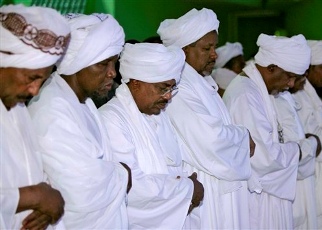Arab Spring countries reportedly intervening to reunite Sudan’s Islamists
July 19, 2012 (KHARTOUM) – Egypt, Tunisia and Libya are conducting an initiative to reconcile Sudan’s bitterly divided Islamists, a spokesman for the ruling National Congress Party (NCP) said on Thursday.

Al-Turabi masterminded the rise of the National Islamic Front (NIF), later re-named (NCP), to power in a 1989 military coup. He was ousted ten years later following a bitter power struggle with President Omar Al-Bashir and his former acolytes, chief among them Vice-President Ali Osman Mohammed Taha.
The veteran Islamist then moved with his followers to form the Popular Congress Party (PCP) and became one of the government’s most vociferous critics.
“The initiative comes to resolve the Islamic, political and intellectual disagreements [between the NCP and the PCP]” Khalid, who was speaking to the Sudanese Media Center (SMC), a pro-government website, said before adding “these countries found that the solution to the internal crisis [in Sudan] cannot materialize without resolving the differences between the two big parties beside renewing the Islamic-political school of thought.”
This development, if true, is likely to stoke concerns on the part of Western countries over the phenomenon of Islamist groups rising to power in post Arab Spring countries like the Muslim Brotherhood in Egypt and the El-Nahda Movement in Tunisia. It also raises the possibility of these groups forging an affinity along ideological lines with Sudan’s Islamists.
According to Khalid, the initiative leading countries “especially Egypt” recognise the importance of finding a “radical solution” to the fallout between the NCP and the PCP. He went on to say that the control of Islamist groups in Egypt, Tunisia and Libya has “revived the aspirations of Sudan’s Islamists to re-unite”
The NCP official included Libya although its Islamists were soundly defeated by liberal forces in recent parliamentary elections.
Khalid claimed that the initiative comes as “an extension” to a number of interactions that occurred recently between PCP and NCP members. He was, Sudan Tribune understands, referring to the gathering of “the Islamist movement Mujahdeen” which took place in the capital Khartoum on Saturday, 14 July.
The gathering brought together more than 500 of NIF “Mujahdeen” who fought in the civil war in the then southern region of South Sudan before it became an independent state last year. Some local newspapers reported that the gathering was highly emotive and witnessed intense discussions between the Mujahdeen from the NCP, PCP and even those who boycotted both factions when the split occurred.
The positive tone in which the NCP official reported the alleged initiative is, however, lacking reciprocity on the part of the PCP whose secretary of external relations, Al-Mahboob Abdel Salam, launched strong criticism against the ruling party on Thursday.
Al-Mahboob, a close aide of Al-Turabi, said, in an interview with Al-Madina newspaper, that the Al-Bashir regime bears the responsibility of “pushing the country to the brink” as he put it.
“The Inqaz [NIF alias for its coup] regime has plunged Sudan into continuous wars, and driven the country’s sons to take up arms for the sake of gaining wealth and power”
Al-Mahboob intoned that the current situation in Sudan is the cumulative effect of 23 years of running the country with wrong policies. He accused Al-Bashir’s regime of causing the “economic collapse” of Sudan due to its failure to use oil revenues to diversify the economy before South Sudan’s secession
The talk of re-unification of Islamists comes amid speculations of an imminent Arab Spring in Sudan as small but growing street protests sparked by worsening economic conditions continue to occur in different parts of the country.
President Al-Bashir dismissed hopes for an Arab Spring in Sudan saying his country only has a “hot summer” that is burning his enemies.
(ST)
